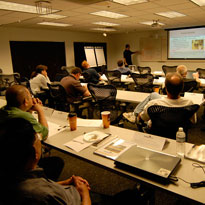IMS – Comprehensive
- Course:IMS – Comprehensive
- Course ID:IMS Duration:2 days Where: Your Office (7+ Persons)
- Download Course Description (PDF)
Available as a private, customized course for your group at your offices or ours and in some cases as a WebLive(TM) class.
Course Outline
- Introduction
- Historical perspective of wireless and wireline network evolution
- Advantages and disadvantages of legacy technologies
- IMS Basics
- Key terminology
- IMS layers, concepts, and elements
- Definitions/functions per node
- Policy overview
- IMS in GSM, CDMA, fixed and WiMAX networks
- IMS key market trends
- SIP overview
- MPLS/DiffServ and packet networks overview
- IMS: A Functional Study
- P,I,S-CSCF
- SBC
- BGCF
- MGCF
- SGW
- MRF
- PDF/PEF
- SPDF/A-RACF
- SCIM
- HSS
- SLF
- Interfaces
- Protocols
- IMS Applications
- Overview of services
- SCIM and composite services
- Services policy
- System Functionality
- Quality of Service (QoS)
- Peering policy
- Access policy
- Applications policy
- Network policy
- Subscriber policy
- Third party policy
- Call Flows
- Mobile to land
- Land to mobile
- 2G mobile to 3G VoIP/IMS mobile
- 3G VoIP/IMS mobile to 2G Mobile
- 2G SMS to 3G/IMS SMS
- Current Standards Work and Challenges
- IPv6
- Legacy internetworking
- Security
- Privacy
- RAN performance requirements
- SCIM
- Session based QoS
- Non-SIP and legacy applications and admission control
- Voice call continuity
- IMS centralized services
- Wrap-up
- Putting it all together
- End game, economics, strategy, financial drivers
- Future of mobile networking
- Q/A and Evaluations
Course in a Nutshell
Communications networks are rapidly evolving into policy-based, packet-oriented networks designed to provide a particular quality-of-services (QoS) for subscribers while reducing the costs associated with capital expansions, network operations, and management. If you are involved with telecommunications engineering, deployment, strategy, marketing, or services creation, it is critical that you understand the technology and business implications of IMS.
In this course, you will study IMS from all angles including the technology, status of wireless and wireline standards, key challenges posed by the technology, financial drivers for its adoption, deployment, and even security considerations. You will also study the issue of network policy and how the different levels and types of policies for QoS and admission control have important bearing on traffic engineering in the evolving networks. We will conclude with a look at the future of telecommunications networks, including a flat, all-IP infrastructure.
Customize It!
Let us know your reason for interest in this technology, so we can expand those portions of this course that are pertinent to your job. For instance:
- Are you a network engineer with a mobile or fixed wireless operator? Let us know the areas of interest to you – whether — planning, growth, capital budgeting, or operations – so we can tailor the course accordingly.
- Are you an RF engineer who would like to “fill in the holes” in your knowledge of core networks? If so, we can present an overview of the state-of-the-art of core networks and how IMS fits into it.
- Are you in marketing and interested in value-added services? Let us know so we can focus on the types of new services that are enabled by IMS.
- Are you a manager or executive involved with technology strategy? If so, we can emphasize the economic impact of the technologies such as capital expenditure, meeting financial targets, parts of the network that may be candidates for cost savings versus those that may not be, and the economic issues posed by the potential technology migration options.
Learn How To
- Identify the market trends that are currently shaping the evolution of fixed and wireless networks.
- List the key technology considerations that impact the evolution of networks.
- Describe the major components of the IMS system and how they work together.
- Describe how the traffic engineering of the evolving networks will require an understanding of the underlying network policies.
Aimed At
Those responsible for telecommunications planning, design, engineering, deployment, business strategy, marketing, and services creation.
Prerequisites
While there are no specific course prerequisites, the standard presentation of this course assumes a bachelor of science in Electrical Engineering, Mathematics, Physics, or a related subject along with an appropriate background in communications. However, the course presentation style can be modified to suit a less technical audience as needed.
- “We contacted Eogogics to provide IMS training on-site for a large group of our senior engineers, and I could not be more pleased with their work. The instructor was very knowledgeable, both academically and pragmatically, and was able to customize the curriculum to make it MSO-specific. The training also included a number of activities which engaged the participants in design and troubleshooting activities that reinforced the techniques being taught. This was our first time using Eogogics, and we will continue to call on them for our future advanced technology training needs." - SR, Senior Engineer, Major MSO
- “The content was excellent, Gerry is a very knowledgeable teacher … very comprehensive workshop!” - Chris G., Principal Engineer, Major Cable Operator

